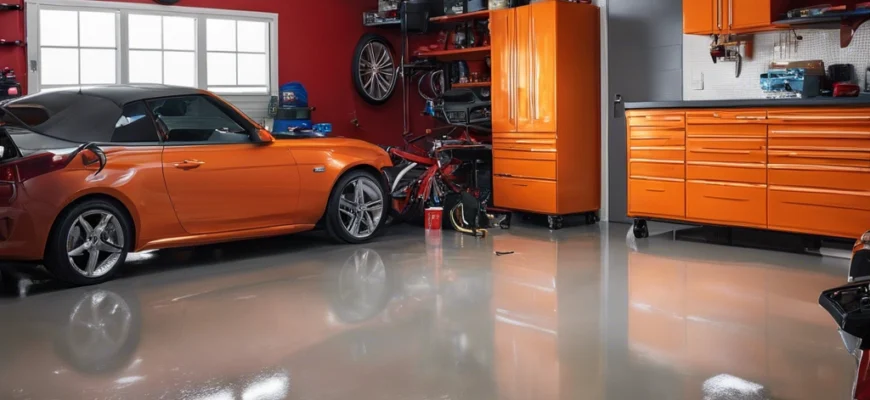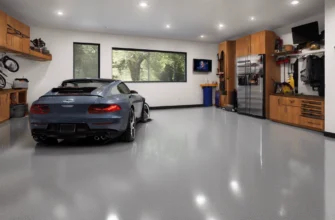- Introduction to Epoxy Garage Flooring
- The Allure of DIY Epoxy Flooring Projects
- Challenges and Risks of DIY Installation
- The Expertise of Professional Installers
- Advantages of Hiring Professionals
- Understanding the Installation Process
- Cost Comparison: DIY vs. Professional Installation
- Common Mistakes to Avoid in Epoxy Flooring Installation
- Conclusion: Making the Right Choice for Your Home
Introduction to Epoxy Garage Flooring
Epoxy garage flooring is a durable and versatile surface solution that has gained significant popularity among homeowners and business owners alike. Composed of a mix of resin and hardener, epoxy creates a robust coating that adheres well to concrete surfaces, forming a protective layer that can withstand heavy traffic and resist stains. The combination of these materials results in a smooth, glossy finish that not only enhances the appearance of a garage but also provides practical functionality.
One of the primary benefits of epoxy garage flooring is its remarkable durability. When properly applied, it can withstand impacts, abrasion, and the harsh conditions often found in garages, such as chemical spills from automotive fluids. Additionally, epoxy is known for its resistance to moisture, which can be particularly advantageous in climates that experience wet weather. This feature helps to prevent water infiltration and the subsequent damage that may arise from it, such as mold and mildew growth.
The aesthetic appeal of epoxy garage flooring cannot be overlooked. Available in a variety of colors and finishes, this flooring solution allows homeowners to choose a style that complements their personal taste and enhances the overall aesthetics of their garage space. Popular decorative options include metallic finishes and color flakes, adding unique visual elements while maintaining practicality.
As the trend of epoxy flooring continues to rise in popularity, many homeowners are contemplating the choice between DIY installation and hiring professional services. This decision is crucial, as it directly impacts the longevity and quality of the flooring system. Understanding the composition, benefits, and rising demand for epoxy garage floors lays the foundation for evaluating the most appropriate installation method for achieving optimal results.
The Allure of DIY Epoxy Flooring Projects
Many homeowners are attracted to the idea of DIY epoxy flooring projects, primarily due to the potential cost savings. With professional installation often coming with a significant expense, tackling a flooring project independently can appear financially appealing. Homeowners may believe that purchasing the necessary materials and investing their time will yield the same beautiful results at a fraction of the price. This perception can be a powerful motivator, as people are often seeking ways to manage their home improvement budgets effectively.
Another factor contributing to the allure of DIY projects is the appeal of engaging in a hands-on task. There is a certain satisfaction that comes from creating a space that reflects one’s personal touch. Homeowners enjoy taking such projects into their own hands, as it allows them to learn new skills, explore their creativity, and even bond with family members through collaborative efforts. The process of installing epoxy flooring can be seen as a fun and rewarding challenge, further encouraging individuals to pursue the DIY route.
In conclusion, while the allure of DIY epoxy flooring projects can be enticing, it is important to weigh the potential challenges that come along with such endeavors. A thorough consideration of time, effort, and expertise involved can lead to more informed decisions regarding flooring options for one’s garage.
Challenges and Risks of DIY Installation
Opting for DIY epoxy garage flooring installation can seem like a cost-effective solution; however, it presents several challenges and risks that can lead to undesirable outcomes. One of the primary issues that DIY installations encounter is uneven application. Unlike professional installers, who have the skills and experience to apply epoxy smoothly and evenly, amateurs may struggle with achieving a uniform finish. This unevenness can not only affect the aesthetics of the floor but may also compromise its durability over time.
Proper surface preparation is crucial before applying epoxy. Many DIY enthusiasts may underestimate the importance of this step, overlooking the need to thoroughly clean, repair, and prepare the concrete surface. Any contaminants, such as oil or grease, can negatively impact the adhesion of the epoxy, leading to peeling or bubbling. Furthermore, if the surface is not adequately repaired, existing cracks may expand under the weight of vehicles, potentially resulting in more significant damage.
Additionally, the use of poor-quality materials or inadequate techniques presents another significant risk. The epoxy market offers a wide range of products, and selecting based solely on price can lead to complications. Inferior materials can result in a subpar finish, reduced longevity, and even safety hazards if the coating fails. Novice installers may also miscalculate the required application thickness or the mixing ratios of the components, which can jeopardize the floor’s integrity.
Ultimately, choosing DIY epoxy flooring can result in added costs and frustration, stemming from unexpected mishaps and potential rework. The initial savings from a DIY project may quickly dissipate when faced with the need for repairs, replacement, or hiring professionals after the fact. It is vital to weigh these risks carefully against the potential benefits before committing to a DIY approach.
The Expertise of Professional Installers
When considering epoxy garage flooring, the choice between a DIY approach and hiring professional installers can significantly impact the outcome of the project. One of the primary reasons to hire experts is their qualifications and extensive training in the application of epoxy flooring materials. Professional installers undergo rigorous training, equipping them with the necessary skills to properly prepare surfaces and apply epoxy effectively. This ensures a high-quality finish that not only looks appealing but also provides durability and longevity.
In addition to training, professional installers come with years of experience. Their familiarity with various types of flooring materials allows them to navigate potential challenges that may arise during the installation process. They understand the specific requirements of different epoxy applications, including the importance of surface preparation, temperature control, and curing times. This expertise enables them to execute the installation efficiently, significantly reducing the likelihood of common issues such as bubbling, peeling, or uneven application, which could arise from a less informed DIY approach.
Moreover, professional installers utilize specialized equipment and tools that are essential for achieving optimal results with epoxy flooring. These tools are often not readily available to the average homeowner, and without them, achieving a flawless finish can be a daunting task. Professionals have access to high-grade rollers, squeegees, and mixing equipment that can enhance the application process, ensuring that the epoxy bonds well with the substrate and complies with industry standards.
Overall, hiring experts for epoxy garage flooring not only guarantees a visually appealing finish but also an investment in quality craftsmanship. The combination of their training, experience, and specialized equipment ensures that the flooring is installed to last, ultimately saving homeowners both time and money in the long run.
Advantages of Hiring Professionals
When considering epoxy garage flooring, one of the primary decisions homeowners face is whether to tackle the project themselves or hire professionals. Engaging skilled professionals for epoxy installation presents numerous advantages that are crucial in achieving high-quality results. One of the most significant benefits is the flawless application that professionals can provide. Their experience and expertise ensure an even and consistent finish, eliminating common DIY pitfalls such as air bubbles, uneven surfaces, or improper mixing of materials. Professional applicators utilize specialized tools and techniques that contribute to a superior outcome.
Another critical advantage of hiring professionals is the speed of completion. Experts possess the knowledge to efficiently prepare the garage surface and apply the epoxy, often completing the job in a fraction of the time it would take an inexperienced individual. This expediency can be particularly valuable for homeowners who rely on their garage for storage or as an operational space, allowing them to return to their regular routine sooner.
In addition to a quicker application process, professional installation often comes with warranty options that provide peace of mind. Many contractors offer warranties that cover the quality of their work and the longevity of the epoxy flooring. This warranty can protect homeowners from potential costs related to repairs or replacement due to poor application. Investing in professional installation minimizes the risk of failure and enhances the long-term durability of the flooring.
Ultimately, hiring professionals for epoxy garage flooring not only ensures a meticulous installation but also saves homeowners time and money in the long term. Through their expertise, professionals provide a level of quality and assurance that is challenging to achieve with a DIY approach, making it a practical decision for many homeowners.
Understanding the Installation Process
The installation of epoxy garage flooring is not a task to be taken lightly, as it involves several meticulous steps that require expertise and precision. A professional installation begins with an initial assessment of the garage floor to identify any cracks, imperfections, or oil stains. This evaluation is crucial, as it influences the preparation required for a durable finish. Following this assessment, the first step is thorough cleaning and preparation of the surface.
Professionals employ powerful cleaning techniques, which may include shot blasting or diamond grinding, to thoroughly remove dirt, grease, and previous coatings. This ensures a strong bond between the epoxy resin and the concrete substrate. Once the surface is clean and dry, any cracks or imperfections are repaired to create a seamless foundation for the epoxy.
Next comes the mixing of the epoxy compound itself, which often involves precise measurements of resin and hardener. This process is critical, as improper mixing can lead to poor adhesion and durability of the flooring. Experienced installers use specialized equipment to mix the components, ensuring a uniform consistency that will cure correctly.
After mixing, the application phase begins. Professionals typically use rollers or squeegees to evenly spread the epoxy across the floor. This method guarantees a smooth and even distribution, reducing the risk of bubbles or uneven surfaces, which can compromise the flooring’s integrity. Depending on the chosen design, additional steps such as adding colored flakes or anti-slip additives can be incorporated during application.
Finally, the epoxy needs time to cure properly. This process can take anywhere from one to several days, depending on environmental factors. Professionals ensure that the area remains undisturbed during this curing period to achieve the best possible outcome. Overall, the installation of epoxy garage flooring by qualified experts not only enhances the aesthetics of the space but also ensures long-lasting durability and performance.
Cost Comparison: DIY vs. Professional Installation
When considering epoxy garage flooring, cost is often a primary factor influencing the decision to undertake a DIY installation or hire professionals. Initially, the materials required for a DIY project may appear more economical. The primary components include epoxy resin, hardeners, primers, and possibly decorative flakes. On average, the materials for a basic DIY epoxy flooring project can range between $100 to $300, depending on the size of the garage and the quality of the products chosen.
In contrast, professional installation typically incurs a higher upfront cost. Hiring experts can range from $500 to $2,000, including both labor and high-quality materials. This option, while appearing costly, often encompasses several advantages that could lead to long-term savings.
One critical aspect often overlooked in DIY projects is the indirect costs associated with time and potential mistakes. DIY enthusiasts may underestimate the time required for surface preparation, application, and curing processes, which could extend the project beyond initially planned timelines. Additionally, mistakes made during the installation can result in costly repairs or the need to reapply the epoxy, effectively negating any initial savings.
Moreover, professional installers come equipped with experience and specialized tools, ensuring efficient and quality application, which can mitigate the risk of future repairs arising from improper installation. The assurance of a job well done, often backed by warranties, provides peace of mind for homeowners. While the initial investment is higher, the longevity and durability of professionally installed epoxy flooring ultimately bring about substantial value.
In sum, when evaluating the cost of DIY versus professional installation, it becomes evident that while DIY may appear cheaper on the surface, it can lead to greater expenses in time, potential mistakes, and future repairs. Therefore, considering the total financial implications of each option is essential before making a final decision.
Common Mistakes to Avoid in Epoxy Flooring Installation
When considering epoxy garage flooring, one of the pivotal aspects that can significantly impact the final outcome is the installation process. Both DIY enthusiasts and professional installers can make errors that lead to unsatisfactory results. Recognizing these common mistakes is crucial for anyone contemplating an installation.
One prevalent mistake in both DIY and professional settings is inadequate surface preparation. The longevity and appearance of epoxy flooring largely depend on how well the underlying concrete surface is treated. Ignoring or inadequately cleaning the surface can lead to poor adhesion, which may result in peeling or bubbling. Professionals usually have the tools and experience to adequately prepare the surface, but DIYers might overlook this critical step due to lack of knowledge or resources.
Another common error lies in the mixing ratios of the epoxy. Achieving the correct resin-to-hardener mix is essential for the durability and performance of the flooring. An incorrect ratio can lead to issues such as sticky surfaces or a non-curing finish. Therefore, it is vital for both professionals and DIY installers to meticulously follow the manufacturer’s guidelines to avoid these pitfalls.
Moreover, failure to adhere to the recommended curing times is a frequent oversight. Many users underestimate the importance of allowing the epoxy to cure fully before subjecting it to foot traffic or vehicle use. Rushing the process can negate the benefits of the installation, leading to premature wear and tear.
Awareness of these common mistakes can help homeowners make informed decisions when choosing between DIY and professional epoxy flooring installation. Understanding the importance of surface preparation, accurate mixing, and proper curing will significantly enhance the success of any epoxy flooring project.
Conclusion: Making the Right Choice for Your Home
When considering epoxy garage flooring installation, homeowners face a critical decision between DIY options and hiring professionals. Throughout this discussion, we have highlighted the numerous advantages associated with professional installation, including superior expertise, quality craftsmanship, and the assurance of lasting results. While DIY projects can seem appealing due to perceived cost savings, they often come with risks that can lead to subpar outcomes, which may ultimately require additional investment to correct.
One of the primary benefits of engaging experienced professionals is their extensive knowledge of epoxy applications. Professionals understand the intricacies involved, from surface preparation to the application techniques that ensure optimal adhesion and durability. They are equipped with advanced tools and materials that may not be readily available to the average homeowner. This level of expertise significantly reduces the likelihood of common pitfalls that can compromise the integrity and appearance of the flooring.
Additionally, hiring experts can save valuable time and effort. Installing epoxy floors requires meticulous attention to detail and can be quite labor-intensive. Homeowners with busy schedules may find that outsourcing this task results in a more efficient project completion, allowing them to focus on other important aspects of their lives. Furthermore, the peace of mind that comes from knowing that the job has been handled by specialists can alleviate stress and concern.
In weighing the pros and cons of DIY versus professional installation, it is crucial to reflect on personal priorities, budget constraints, and desired outcomes. Making an informed decision about epoxy garage flooring can enhance not only the functionality of the space but also its aesthetic appeal. The long-term benefits of trusting experienced professionals often outweigh the short-term allure of DIY projects. Thus, enlisting the help of experts may just be the wisest choice for achieving a stunning and durable garage floor.








